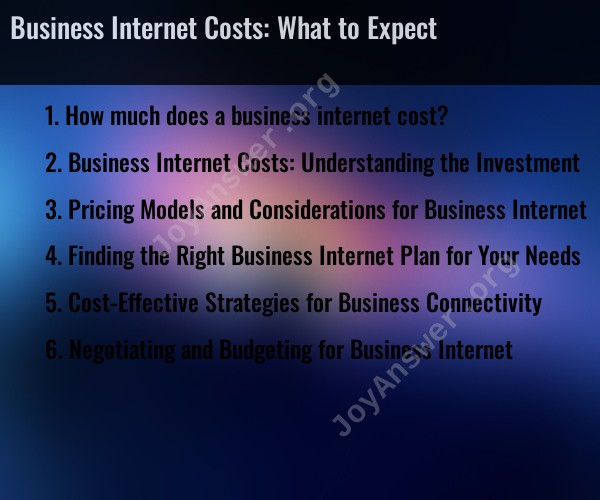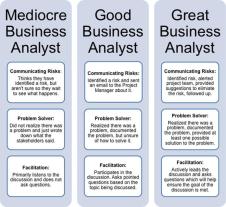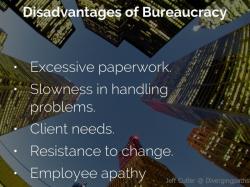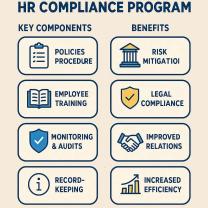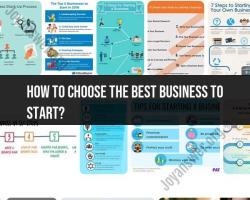How much does a business internet cost?
The cost of business internet can vary significantly based on several factors, including the type of connection, the speed and bandwidth requirements, the location of your business, and the service provider. Here are some general guidelines to help you understand what to expect in terms of business internet costs:
Type of Connection:
DSL (Digital Subscriber Line): DSL tends to be the most affordable option. Costs can range from $40 to $80 per month for basic plans. However, DSL generally offers slower speeds compared to other options.
Cable Internet: Cable internet is often faster than DSL. Prices typically range from $60 to $120 per month.
Fiber Optic Internet: Fiber is the fastest and most reliable option. Prices for business fiber internet can start at around $70 to $100 per month for basic plans but can go significantly higher for high-speed and dedicated fiber connections.
T1/T3 Lines: These are dedicated, high-speed connections, and they can be quite expensive. T1 lines might start at $250 to $400 per month, while T3 lines can cost thousands of dollars per month.
Speed and Bandwidth:
- Faster internet speeds and higher bandwidth will generally cost more. Businesses with high data transfer requirements or many users will need higher speed plans, which come at a premium.
Location:
- The cost of business internet can vary based on your business's location. Urban areas tend to have more competitive pricing and a wider range of options, while businesses in rural or remote areas may have fewer choices and potentially higher costs.
Service Provider:
- Different internet service providers have different pricing structures. Prices can also vary based on the quality of service, customer support, and added features offered by each provider.
Additional Services:
- Some providers offer bundled services that include internet, phone, and TV. The cost will depend on the specific package and the additional services included.
Contract Length:
- Many providers offer discounts for longer-term contracts. The longer the commitment, the lower the monthly cost may be. However, long-term contracts may come with early termination fees.
Service Level Agreement (SLA):
- For businesses that require high reliability and uptime, premium service providers offer Service Level Agreements (SLAs) that guarantee a certain level of performance. These plans are more expensive but provide enhanced reliability and support.
Installation Costs:
- Consider installation fees, which can vary depending on the type of connection and the complexity of the installation.
Add-Ons and Extras:
- Depending on your business needs, you might require additional services such as static IP addresses, security features, or VPN services, which can add to the overall cost.
To determine the exact cost for your business, you should contact several internet service providers in your area, compare their offerings, and request custom quotes based on your specific requirements. Keep in mind that while cost is important, you should also consider the quality, reliability, and customer support provided by the ISP, as these factors can be critical for your business's internet connectivity.
Business Internet Costs: Understanding the Investment
Business internet is an essential expense for any business, but the costs can vary widely depending on your needs. It is important to understand the different factors that affect the cost of business internet so that you can make the best decision for your business.
Here are some of the key factors that affect the cost of business internet:
- Speed: The faster your internet speed, the higher the cost will be.
- Bandwidth: Bandwidth is the amount of data that can be transferred over your internet connection at once. The more bandwidth you need, the higher the cost will be.
- Data caps: Some business internet plans have data caps, which limit the amount of data you can use each month. If you exceed your data cap, you may be charged overage fees.
- Contract length: Business internet contracts typically range from one to three years. The longer the contract, the lower the monthly rate will be.
- Equipment fees: Some business internet providers charge equipment fees for things like routers and modems.
Pricing Models and Considerations for Business Internet
There are a variety of different pricing models for business internet. The most common pricing models are:
- Tiered pricing: Tiered pricing plans offer different speeds and bandwidth options at different price points.
- Usage-based pricing: Usage-based pricing plans charge you based on how much data you use each month.
- Dedicated pricing: Dedicated pricing plans offer a fixed amount of speed and bandwidth for a fixed monthly fee.
When choosing a business internet plan, it is important to consider the following:
- Your internet needs: How much speed and bandwidth do you need? Do you have any special requirements, such as a dedicated IP address or peer-to-peer support?
- Your budget: How much can you afford to spend on business internet each month?
- Your contract length: How long are you willing to commit to a contract?
- Your equipment needs: Do you need to rent or purchase equipment from your internet provider?
Finding the Right Business Internet Plan for Your Needs
Once you have considered your needs and budget, you can start shopping for business internet plans. Here are some tips for finding the right plan for you:
- Compare plans from different providers. Get quotes from multiple internet providers to compare prices and features.
- Read the fine print. Make sure you understand the terms and conditions of each plan before you sign up.
- Ask about discounts. Many internet providers offer discounts for businesses that sign up for multiple services or commit to a long-term contract.
4. Cost-Effective Strategies for Business Internet
There are a number of ways to reduce the cost of business internet. Here are a few tips:
- Bundle services. Many internet providers offer bundles that include internet, phone, and TV services. Bundling services can save you money on your monthly bill.
- Negotiate your contract. If you are willing to sign a long-term contract or commit to a higher data cap, you may be able to negotiate a lower monthly rate.
- Use a business internet broker. Business internet brokers can help you to compare plans from different providers and negotiate the best price for your business.
Negotiating and Budgeting for Business Internet
When negotiating and budgeting for business internet, it is important to keep the following in mind:
- Do your research. It is important to understand the different pricing models and options available before you start negotiating.
- Be prepared to walk away. If you are not able to negotiate a price that you are comfortable with, be prepared to walk away.
- Factor in all of the costs. When budgeting for business internet, be sure to factor in the cost of equipment, installation, and any other associated fees.
By following these tips, you can find the right business internet plan for your needs and budget.
